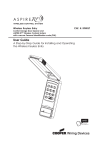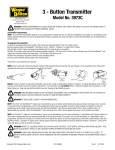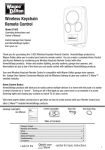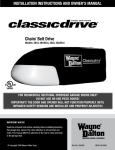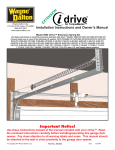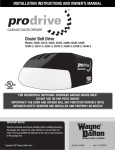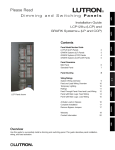Download Wayne 3018 Owner`s manual
Transcript
Photoelectric Safety Sensors Installation Instructions and Owner’s Manual Wayne-Dalton Corp. P.O. Box 67 Mt. Hope, OH 44660 (888) 827-3667 www.wayne-dalton.com Opener Models: Torsion idrive™ models: 3651-372, 3750-372. Quantum™/Classicdrive™ models: 3012, 3014, 3016, 3018, 3212, 3213, 3214, 3312, 3313, 3314, 3316, 3412, 3414, 3512, 3514. DoorMaster™ models: BDOR-2000 & BIRW-2000 idrive™ models: 3660-372, 3661-372, 3662-372, 3760-372, 3751-372. WIRES ARE PRE-ATTACHED Photoelectric Sensors Hardware: 297218 (2) 5/16 x 1-1/2” Lag Screws (2) 1” Flat Head Nails (2) 1/4-20 x 1/2” Carriage Bolts, Washers & Nuts (2) Wall Mounting Brackets (2) “U” Brackets (1) Power Cord Clip (adhesive back) (1) Jumper Photoelectric Sensors (1) Sender w/Wire: 260600 (1) Receiver w/Wire: 260597 Important Notice! DOOR OPENER WILL NOT OPERATE PROPERLY UNTIL PHOTOELECTRIC SENSORS ARE INSTALLED AND PROPERLY ADJUSTED! DO NOT OPERATE DOOR OPENER UNTIL IT IS FULLY INSTALLED, ADJUSTED AND YOU ARE INSTRUCTED TO DO SO! © Copyright 2003 Wayne-Dalton Corp. Part No: 306736 New 9/4/2003 Table of Contents Important Safety Instructions For Installation And Use ○ ○ ○ ○ ○ ○ ○ ○ ○ ○ ○ ○ 2. Bracket Installation ○ ○ ○ ○ ○ ○ ○ ○ ○ ○ ○ ○ ○ ○ ○ ○ ○ ○ ○ ○ ○ ○ ○ ○ ○ ○ ○ ○ ○ ○ ○ ○ ○ ○ ○ ○ ○ ○ 3. Wiring Installation “Quantum™/Classicdrive™” ○ ○ ○ ○ ○ ○ ○ ○ ○ ○ ○ ○ ○ ○ ○ ○ ○ 4. Wiring Installation “DoorMaster™” ○ ○ ○ ○ ○ ○ ○ ○ ○ ○ ○ ○ ○ ○ ○ ○ ○ ○ ○ ○ ○ ○ ○ ○ ○ ○ ○ ○ 4. Wiring Installation “idrive™” ○ ○ ○ ○ ○ ○ ○ ○ ○ ○ ○ ○ ○ ○ ○ ○ ○ ○ ○ ○ ○ ○ ○ ○ ○ ○ ○ ○ ○ ○ ○ ○ 5. Wiring Installation “Torsion idrive™” ○ ○ ○ ○ ○ ○ ○ ○ ○ ○ ○ ○ ○ ○ ○ ○ ○ ○ ○ ○ ○ ○ ○ ○ ○ ○ 5. Photoelectric Safety Sensor Alignment ○ ○ ○ ○ ○ ○ ○ ○ ○ ○ ○ ○ ○ ○ ○ ○ ○ ○ ○ ○ ○ ○ ○ ○ 6. Photoelectric Obstruction Sensing Test ○ ○ ○ ○ ○ ○ ○ ○ ○ ○ ○ ○ ○ ○ ○ ○ ○ ○ ○ ○ ○ ○ ○ 6. Important Safety Instructions ○ ○ ○ ○ ○ ○ ○ ○ ○ ○ ○ ○ ○ ○ ○ ○ ○ ○ ○ ○ ○ ○ ○ ○ ○ ○ ○ ○ ○ ○ ○ 7. Warranty ○ ○ ○ ○ ○ ○ ○ ○ ○ ○ ○ ○ ○ ○ ○ ○ ○ ○ ○ ○ ○ ○ ○ ○ ○ ○ ○ ○ ○ ○ ○ ○ ○ ○ ○ ○ ○ ○ ○ ○ ○ ○ ○ ○ ○ ○ ○ 7. Customer Service Number ○ ○ ○ ○ ○ ○ ○ ○ ○ ○ ○ ○ ○ ○ ○ ○ ○ ○ ○ ○ ○ ○ ○ ○ ○ ○ ○ ○ ○ ○ ○ ○ ○ 7. THIS IS THE SAFETY ALERT SYMBOL. IT IS USED TO ALERT YOU TO POTENTIAL PERSONAL INJURY HAZARDS. OBEY ALL SAFETY MESSAGES THAT FOLLOW THIS SYMBOL TO AVOID POSSIBLE INJURY OR DEATH. WARNING DISCONNECT ALL POWER FROM GARAGE DOOR OPENER BEFORE SERVICING OR INSTALLING ACCESSORY PRODUCTS. IMPORTANT SAFETY INSTRUCTIONS FOR INSTALLATION AND USE READ AND FOLLOW ALL INSTALLATION INSTRUCTIONS. AFTER INSTALLING OPENER, THE DOOR MUST REVERSE WHEN IT CONTACTS A 1 INCH HIGH SOLID TEST OBJECT ON THE FLOOR. DO NOT USE SENSITIVITY ADJUSTMENT TO COMPENSATE FOR A POORLY OPERATING DOOR. THIS WILL INTERFERE WITH THE PROPER OPERATION OF THE SAFETY REVERSE MECHANISM. OPEN DOOR MUST NOT CLOSE AND CLOSING DOOR MUST OPEN IF PHOTOELECTRIC SYSTEM IS OBSTRUCTED BY 6”X HIGH OBJECT, USING TEST PROCEDURE DESCRIBED IN STEP 4. DO NOT CONNECT OPENER TO ELECTRICAL OUTLET UNTIL INSTRUCTED TO DO SO. DO NOT WEAR RINGS, WATCHES OR LOOSE CLOTHING WHEN INSTALLING OR SERVICING A GARAGE DOOR SYSTEM. USE A STURDY, NONMETALLIC STEP LADDER AND WEAR EYE PROTECTION. INSTALLATION AND WIRING MUST COMPLY WITH LOCAL BUILDING AND ELECTRICAL CODES. CONNECT THE POWER CORD TO A PROPERLY GROUNDED OUTLET. DO NOT REMOVE ROUND GROUND PIN FROM POWER CORD. 2 Step 1: Photoelectric Safety Sensor Bracket Installation WARNING DISCONNECT ALL POWER TO GARAGE DOOR OPENER BEFORE SERVICING OR INSTALLING ACCESSORIES OR PHOTOELECTRIC SAFETY SENSORS. FOR ALL OPENERS, UNPLUG 120 V AC POWER CORD FROM RECEPTACLE. FOR DOORMASTER, ALSO UNPLUG TELEPHONE CORD TYPE COMMUNICATIONS CABLE. Select a mounting position, no more than 5 inches above the floor to center line of wall mounting bracket. The sending and receiving units should be mounted inside the door opening to minimize any interference by the sun. However, the sensors should be mounted as close to the door track or inside edge of the door as possible to offer maximum entrapment protection. It is very important that both wall brackets be mounted at the same height for proper alignment. “U” BRACKETS WALL MOUNTING BRACKETS NUT (1) 5/16 X 1-1/2” LAG SCREW The brackets may be temporarily mounted to the jamb with a 1” WASHER flat head nail (provided) using the small hole above the slot. Using two 5/16 x 1-1/2” lag screws (provided), permanently mount the wall mounting brackets to both door jambs. In some installations it may be necessary to attach a wooden spacer to (1)1/4-20 X 1/2” the wall to achieve the required clearance. CARRIAGE BOLT Attach the “U” brackets to the wall brackets with a 1/4-20 carriage bolt, washer and nut (provided). Insert the bolt from the inside of the “U” bracket and hand tighten only at this time. NAIL 5” TAB HOLES TOP & BOTTOM Identify which side of the garage door opening (if any) is “likely” to be exposed to sunlight. Since sunlight may affect photoelectric sensors, you should mount the sending unit (not the receiving unit) on the side of the door opening exposed most to the sun. TABS TOP & BOTTOM NOTE: If wires must be lengthened or spliced into prewired installation, use wire nuts or suitable connectors. Attach the sending and receiving units to the “U” brackets by inserting their tabs into the respective holes. RECEIVING UNIT SENDING UNIT (NO LED) LED ALIGNMENT LIGHT 3 Step 2: Photoelectric Safety Sensor Wiring Installation For: Quantum™/Classicdrive™ models: 3012, 3014, 3016, 3018, 3212, 3213, 3214, 3312, 3313, 3314, 3316, 3412, 3414, 3512, 3514. Uncoil wires from the photoelectric sensors and route wires up the garage walls and along ceiling towards the right side of the opener (see Fig. 1). Route wires behind torque tube and tack wires in place with insulated staples (not supplied). Take care to run wires in a location where they will not interfere with the operation of the door and do not staple through wire. IMPORTANT! Keep sender/receiver wires away from moving members. Connect photoelectric sensors to opener per diagram (Fig. 1). Shorten the wires as necessary and separate the wire ends. Strip about 1/2” of insulation off each wire and attach the solid color wires to the COM terminal and the wires with a black stripe to the OBS terminal. Tighten terminal screws securely, using a small blade screw driver. Be sure to observe polarity. Pull on external wires to test for secure connection. Check that the wires are stapled in place and staples have not cut wire insulation. Reconnect the power to the garage door opener. Proceed to Step 3. Opener FIG. 1 Wire Routing Black striped wires (OBS terminal) Sender wires Solid color wire (COM terminal) Receiver wires Solid color wire (COM terminal) Quantum™/Classicdrive™ DoorMaster™ models: BDOR-2000 & BIRW-2000 Uncoil wires from the photoelectric sensors and route wires up the garage walls and along door towards the right side of the opener (see Fig. 2). Route wires behind torque tube and tack wires in place with insulated staples (not supplied). Take care to run wires in a location where they will not interfere with the operation of the door and do not staple through wire. FIG. 2 Wire Routing IMPORTANT! Keep sender/receiver wires away from moving NOTE: If wires must be lengthened or spliced into members. prewired installation, use wire nuts or a suitable connector. Pay attention to polarity. Connect photoelectric sensors to opener per diagram (Fig. 2). Shorten Sender wires Black striped wire wires as necessary and separate wire ends. Strip about 1/2” of (OBS terminal) Solid color wires insulation off each wire and attach the solid color wires to the COM (COM terminal) terminal and the wires with the black stripe to the OBS terminal. Receiver Tighten terminal screws securely, using a small blade screwdriver. wires Be sure to observe polarity. Pull on external wires to test for secure Jumper connection. Check that the wires are stapled in place and staples (Model: BDORhave not cut wire insulation. Remember to connect telephone type 2000 only) cord for Doormaster™ installation. Once wires are connected, switch the jumper (model BDOR-2000 only) from “Disable” to “Enable” Black striped wire (OBS terminal) by pulling jumper off pins 2 and 3 and reinstalling jumper on pins 1 and 2. Right endcap NOTE: The jumper is set to disable from the factory. DoorMaster™ Reconnect the power to the garage door opener. Proceed to Step 3. 4 Step 2: Photoelectric Safety Sensor Wiring Installation For: idrive™ models: 3660-372, 3661-372, 3662-372, 3760-372, 3751-372. Uncoil wires from photoelectric sensors and route wires up garage wall and along door header towards the right side of the opener (see Fig. 3 ). Route wires behind torque tube and tack wires in place with insulated staples (not supplied).Take care to run wires in a location where they will not interfere with the operation of the door and do not staple through wire. Connect photoelectric sensors to the opener terminal block on right side of the opener. Separate wire ends and strip about 1/2” of insulation off FIG. 3 Wire Routing each of the wire ends. Insert a 3/32” (2.5mm) max. width flathead Insert wires screwdriver into the lower hole #1 of the terminal block. Twist screwdriver into upper Jumper to open wire clamp in upper hole #1 of terminal block. Insert both sender hole #1 Insert wires installed and receiver solid white wires into upper hole #1 until the wires bottom into upper out and release screwdriver tension. Insert both sender and receiver wires hole #2 (white with black stripe) into upper hole #2 by the same process on lower hole #2 of terminal block. Be sure to observe polarity. Once wires are connected, install jumper on to the left most set of pins labeled “PE” of the opener. Jumper IMPORTANT! Keep sender/receiver wires away from moving members. Insert screw Insert screw driver into lower Pull on external wires to test for secure connection. Check that the wires driver into hole #2 are stapled in place and staples have not cut wire insulation. Reconnect lower hole #1 the power to the garage door opener. Proceed to Step 3. Torsion idrive™ models: 3651-372, 3750-372. To locate the terminal block for the infrared sensor sender/receiver wires, you must first move the right hand gear assembly. Loosen the set screw and slide the gear assembly away from the opener. Uncoil wires from photoelectric sensors and route wires up garage wall and along door header towards the right side of the opener (see Fig. 4). Route wires behind torque tube and tack wires in place with insulated staples (not supplied). Connect photoelectric sensors to the opener terminal block on right side of the opener. Separate wire ends and strip about 1/2” of insulation off each of the wire ends. Insert a 3/32” (2.5mm) max. width flathead screwdriver into the upper hole #1 of terminal block. Twist screwdriver to open wire clamp in lower hole #1 of terminal block. Insert both sender and receiver solid white wires into lower hole #1 until the wires bottom out and then release screwdriver tension. Insert both sender and receiver wires (white with black stripe) into lower hole #2 by the same process. Be sure to observe polarity. Keep the sender and receiver wires straight and organized by wrapping them around the backside of the opener and securing them using the cord clip (adhesive backed) provided.(Insure the surface the cord clip is attached to is clean and oil free. IMPORTANT! Keep sender/receiver wires away from moving members. Pull on external wires to test for secure connection. Check that the wires are stapled in place and staples have not cut wire insulation. Reconnect the power to the garage door opener. NOTE: Reinstall the right hand gear assembly onto the drive gear. Ensure that the gear assembly is installed correctly. Proceed to Step 3. 5 Pins labeled “PE” White wires with black stripe Solid white wires idrive™ FIG. 4 Wire Routing Right hand gear assembly Insert screwdriver into upper holes Set screw Insert wires into lower holes Cord clip Torsion idrive™ Step 3: Photoelectric Safety Sensor Alignment IMPORTANT! - This infrared safety sensor sends an invisible beam of light from the sending unit to the receiving unit across IN the door opening. The door opener will not operate until the safety sensor is connected to the power unit and properly aligned. If the invisible beam of light is misaligned or obstructed, an open door cannot be closed by the transmitter or a momentary activation of the wall mounted push button. However, the door OUT may be closed by holding your finger on the wall push button (constant pressure) until the door travels to a fully closed position. WARNING FAILURE TO MAKE ADJUSTMENTS FIG.5 IN 1/4-20 Carriage bolts Top View Align In Center (In/Out) OUT FIG.6 For this adjustment bend bracket at wall mount Top view Align in Center COULD RESULT IN SEVERE OR FATAL INJURY. At this point you will be able to activate the opener; it will open, but will not close the door unless the sensors are aligned and unobstructed. The safety sensors can be aligned by moving the sending and receiving units in or out (see Fig. 5) until the alignment light on the receiving unit comes on. The 1/4-20 carriage bolt can be loosened to move the unit in or out, as required. If you have difficulty aligning beams, check that both brackets are mounted at the same height and remount if necessary. Additional minor adjustments can be made by lightly bending the mounting brackets (see Fig. 6).Once the alignment light comes on, tighten all bolts and mounting screws. Finish securing all wiring. Make sure not to break or pierce any of the wires. Loop and secure any extra wire. Now, using the wall station’s up/down button, activate the opener and check that it will operate through full open and close cycles. Step 4: Photoelectric Obstruction Sensing Test Starting with the door in the fully open position, place a 6” high object on the floor progressively one foot from the left side of the door, center of door and one foot from the right side of the door. (Fig. 7) In each position, activation of the opener with the wallstation up/down button should cause the door to move no more than one foot, stop and then reverse to fully open position. The same 6” high object when placed on the floor, while door is closing, should also cause the door to reverse. FIG. 7 6” 12” 12” WARNING WHEN PERFORMING THIS PART OF THE TEST, DO NOT PLACE YOURSELF UNDER DESCENDING DOOR, OR SEVERE OR FATAL INJURY MAY RESULT. WARNING IF THE OPENER DOES NOT RESPOND PROPERLY, OR FAILS THESE TEST, HAVE A QUALIFIED SERVICE PERSON MAKE NECESSARY ADJUSTMENTS/REPAIRS. FAILURE TO MAKE ADJUSTMENTS COULD RESULT IN SEVERE OR FATAL INJURY. 6 IMPORTANT SAFETY INSTRUCTIONS WARNING TO REDUCE THE RISK OF SEVERE INJURY OR DEATH: Please thoroughly read safety rules on Page 2 and the following operating instructions. Operate only when opener is properly adjusted and the door is visible and unobstructed. Never let children operate or play with Always keep moving door insight and keep door controls. Keep remote control away people and objects away from the door from children until it is completely closed. NO ONE Test door opener monthly. Open garage SHOULD CROSS THE PATH OF THE door MUST NOT close and closing door MOVING DOOR. MUST open if photoelectric obstruction sensors system is obstructed by 6” high Use the emergency release only when the object, using test procedure described in door is closed. Use caution when using Step 4. If opener fails this test, disconnect this release with door open. Weak or immediately and call for technical support. broken springs may cause the door to fall Malfunctioning opener can cause severe rapidly, causing serious injury or death. injury or death. Test door opener monthly. The garage door MUST reverse on contact with a 1-1/2 inch KEEP GARAGE DOORS PROPERLY high object (or a 2 x 4 board laid flat) on BALANCED. See owner’s manual. An the floor. On Quantum™ openers, if improperly balanced door could cause adjusting either the force or the limit of severe injury or death. Have a qualified travel, retest the door opener. Failure to service person make repairs to cables, adjust the opener properly could cause spring assemblies and other hardware. severe injury or death. Photoelectric Safety Sensors 90-DAY LIMITED WARRANTY The Manufacturer warrants that the PHOTOELECTRIC SAFETY SENSORS will be free from defects in materials and workmanship including electronic components for a period of 90-DAYS from the date of installation, provided it is properly installed, maintained and cared for under specified use and service. This Warranty extends to the original homeowner, providing the PHOTOELECTRIC SAFETY SENSORS are installed in his/her place of primary residence. It is not transferable. The warranty applies to residential property only and is not valid on commercial or rental property. NO EMPLOYEE, DISTRIBUTOR, OR REPRESENTATIVE IS AUTHORIZED TO CHANGE THE FOREGOING WARRANTIES IN ANY WAY OR GRANT ANY OTHER WARRANTY ON BEHALF OF MANUFACTURER. The Manufacturer shall not be responsible for any damage resulting to or caused by its products by reason of installation, improper storage, unauthorized service, alteration of products, neglect or abuse, any acts of nature beyond Manufacturer’s control (such as, but not limited to, lightning, power surges, water damage, etc.), or attempt to use the products for other than the customary usage or for their intended purposes. The above warranty does not cover normal wear or any damage beyond Manufacturer’s control or replacement labor. THIS WARRANTY COVERS A CONSUMER PRODUCT AS DEFINED BY THE MAGNUSON-MOSS WARRANTY ACT. NO WARRANTIES, EXPRESSED OR IMPLIED, (INCLUDING, BUT NOT LIMITED TO, THE WARRANTY OF MERCHANTABILITY OR FITNESS FOR A PARTICULAR PURPOSE), SHALL EXTEND BEYOND THE APPLICABLE TIME PERIOD STATED IN BOLD FACE TYPE ABOVE. Claims for defects in material and workmanship covered by this warranty shall be made in writing to the dealer from whom the product was purchased within the warranty period. Manufacturer may either send a service representative or have the product returned to the Manufacturer at Buyer’s expense for inspection. If judged by Manufacturer to be defective in material or workmanship, the product will be replaced or repaired at the option of the Manufacturer, free from all charges except authorized transportation and replacement labor. THE REMEDIES OF BUYER SET FORTH HEREIN ARE EXCLUSIVE AND ARE IN LIEU OF ALL OTHER REMEDIES, THE LIABILITY OF MANUFACTURER, WHETHER IN CONTACT, TORT, UNDER ANY WARRANTY OR OTHERWISE, SHALL NOT EXTEND BEYOND ITS OBLIGATION TO REPAIR OR REPLACE, AT ITS OPTION, ANY PRODUCT OR PART FOUND BY MANUFACTURER TO BE DEFECTIVE IN MATERIAL OR WORK SHALL NOT BE RESPONSIBLE FOR ANY DIRECT, INDIRECT, SPECIAL OR CONSEQUENTIAL DAMAGES OF ANY NATURE. This Warranty gives you specific legal rights and you may have other rights, which may vary from state to state. However, some states do not allow limitation on how long an implied warranty lasts or the exclusion or limitation of incidental or consequential damages so the above limitations or exclusions may not apply to you. © Copyright Wayne-Dalton Corp. 2003 Questions?? For quick answers and helpful advise, call Wayne-Dalton Customer Service (888) 827-3667 7








